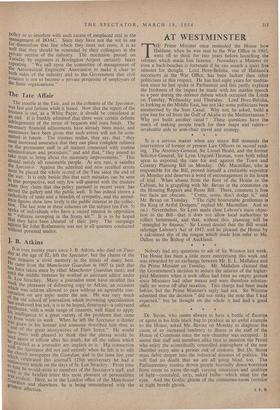AT WESTMINSTER
THE Prime Minister once reminded the House how Haldane, when he was sent to the War Office in 1905, went off to think for two years before launching the reforms which made him famous. Nowadays •a Minister or even a back-bencher, is fortunate if he can snatch a quiet five minutes for thought. Lord Hore-Belisha, one of Haldane's successors at the War Office, has been luckier than other politicians in this respect., He has had eight years for medita- tion since he last spoke in Parliament and this partly explains the freshness of the impact he made with his maiden speech as a peer during the defence debate which occupied the Lords on Tuesday, Wednesday and Thursday. Lord Hore-Belisha, in looking at the Middle East, has not like some politicians been mesmerised by the Suez Canal. Why not, he asked, build a pipe line for oil from the Gulf of Akaba to the Mediterranean ? Why not build another canal ? These questions have the merit of making people reach for their maps and rulers— invaluable aids to arm-chair travel and strategy.
* * * It is a serious matter when any major Bill demands the intervention of former or present Law Officers on second read- ing. The Attorney-General, Sir Lionel Heald, and the former Solicitor-General, Sir Lynn Ungoed-Thomas, were both relied upon to expound the case for and against the Town and Country Planning Bill on Monday. (Mr. Macmillan, who is responsible for the Bill, proved himself a creditable expositor on Monday and deserves a word of encouragement in his hours of trial. When 'absent from the floor of the House or the Cabinet, he is grappling with Mr. Bevan in the committee on the Housing Repairs and Rents Bill.. There, comment is free but facts are obscure. " Come, conic, don't dodge it," said Mr. Bevan on Tuesday. " The right honourable gentleman is the King of Artful Dodgers," replied Mr. Macmillan. And so on.) Nevertheless, Sir Lynn made clear Labour's main objec- tion to the Bill—that it does not allow local authorities to collect betterment, and that, without this, planning will be ' strangled by finance.' Sir Lionel denied that the Bill would sabotage Labour's Act of 1947, .and he pleased the. House by a calculated slip of the tongue which made him refer to Mr. Dalton as the Bishop of Auckland.
• * * * Nobody had any questions to ask of Sir Winston last week. The House has been a little more enterprising this week and was rewarded by an exchange between Mr. E. L. Mallalieu and the Prime Minister on Tuesday. Mr. Mallalieu claimed that the Government's decision to reduce the salaries of the higher- paid Ministers when it took office had been an empty gesture since Ministers had other means and were therefore substan- tially no worse off after taxation. This charge had been made before, but the Prime Minister's reply had not. Sir Winston admitted that the decision " did not strike the note that I had expected," but he thought on the whole it had had a good effect.
* * * Dr. Stross, who seems always to have a bottle of fluorine or agene in his little black bag to produce as an awful example to the House, asked Mr. Bevies on Monday to diagnose the cause of an increased tendency to illness in the staff of the House of. Commons since the new chamber was occupied. It seems that staff and members alike (not to mention the Press) who enjoy the scientifically controlled atmosphere of the new chamber enjoy also a greater risk of sinusitis. But Dr. Stross must delve deeper into the industrial diseases of politics. He will find no doubt that we are all going blind, too. The Parliamentary routine drives people hurriedly down 'corridors from room to room through varying intensities and qualities of light—concealed, strip, naked bulbs—which must tire the eyes. And the Gothic gloom of the committee-room corridor at night breeds ghosts.


































 Previous page
Previous page